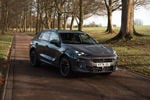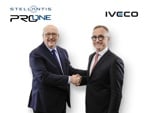Mercedes-Benz head of fleet Sally Dennis explains the difference in strategy that is winning over fleet customers.
Afew years ago Mercedes-Benz wouldn’t have scored particularly strongly in any surveys about performance in fleet.
It was certainly in the corporate sector, but the business was largely structured around retail sales.
In the past, P11D pricing of Mercedes-Benz cars had been higher than for equivalent models from BMW and Audi and, with CO2 emissions often higher than for rivals, it meant company car drivers were certainly paying for the privilege of having the three-pointed star on the front of their vehicles.
But anyone dealing with Mercedes-Benz regularly would have noticed a change in the past three years.
The company recruited Nick Andrews as head of fleet, recognising his success in a similar role at Seat. He set about implementing changes that ultimately would make Mercedes-Benz a company that was easier for fleets to do business with.
In 2012, Mercedes-Benz shared its plans for a more approachable, straightforward way to do business in the fleet market, including the creation of a strategic account manager team and the launch of the small-business-in-partnership (SBiP) scheme, plus chauffeur and direct sales programmes.
Last year Mercedes-Benz added more than 10,000 registrations in the fleet sector. The fleet market itself was up 5.7% on the previous year; Mercedes-Benz fleet sales were up 22%.
There is an ambition for Mercedes-Benz to overtake Audi and BMW as the number one premium brand for sales in UK fleet, the UK new car market overall and, ultimately, globally.
For the UK, changes to help progress on that front have already taken place. Andrews has been promoted to
fleet and remarketing director, as with an increasing number of new car sales there would need to be a greater focus on managing those cars coming back into the used market.
Sally Dennis, who has been on the fleet team at Mercedes-Benz almost at long as Andrews, is now head of fleet.
Fleet News: What has been behind the changes over the past few years?
Sally Dennis: The fleet team now works differently from how it operated three years ago. We don’t judge ourselves by how many awards we win. We are driven by our commitment to our customers, and they have helped us shape what we’re doing.
FN: What do you think made the judges choose the new S-Class as the Best Chauffeur Car in 2014?
SD: The S-Class has been highly regarded in that sector for many years and with the new model the engineers have done fantastic work to make it the leading car in the sector. It offers new technology for convenience and safety, and class leading low-CO2 emissions. We introduced the diesel hybrid model with the 2.2-litre engine, which is a unique proposition. We’ve been number one in six of the last eight years with S-Class, and the latest model will help attract new customers to the brand.
FN: How do you plan to continue the momentum in sales growth from the past few years?
SD: Around 80% of our business with the new A-Class was conquest sales, but one area we need to focus more on is what the customer wants. We attend events such as Company Car in Action (CCIA) to ensure we engage with customers and demonstrate the fleet offering. We thought this event was better than last year and we had a greater number of test drives. We showed the new C-Class, which has CO2 emissions from 103g/km, and demonstrated that we truly have a new car that can face competitors head on. Recently introduced models such as the CLA and GLA also have strong appeal for user-choosers and CCIA was an ideal opportunity for them to experience the cars for themselves.
FN: There has been strong demand for some of those models. How can you avoid fleet customers facing lengthy waits for deliveries?
SD: We have a priority system that we can activate when we get into long lead times. When ordered through the direct sales programme, it allows us to put a priority on the fleet’s order. Some manufacturers don’t do this and it can lead to supply shortages for fleet customers. We’ll always try to manage customer expectations as best we can in these circumstances.
FN: The new C-Class had a tough job on its hands against cars like the Audi A4 and BMW 3 Series, as well as a new Jaguar XE rival in 2015. Does it have the tools to succeed?
SD: Technology is changing and we need to be class-leading. We’ve been able to include some of the technology introduced on the new S-Class, such as the touch-pad, the LED display and Airmatic suspension. Options packs logically combine items that customers would want to choose together, and this is better for residual values and wholelife costs. It helps us with the used cars when the vehicles come back on to the market carrying a lot more specification.
FN: So customers are already helping inform decisions about Mercedes-Benz products?
SD: Positive feedback helps us know that what we’re doing is right and we can keep building on it. Having a strategy is all well and good but we need to be accessible and open. Customers are at the heart of everything we’re doing, and we engage with them in forums and so on. We have to ensure we are accessible to them.
Progress continues, and perhaps something that encapsulated both the success of the S-Class and Mercedes-Benz wins at the Fleet News Awards was the recent announcement that it will become a sole supplier for chauffeur company Tristar Worldwide.
The company had previously used Volvos as well as some Mercedes-Benz models, but has now switched to a solus arrangement, partly because of requests for Mercedes-Benz models by customers. At the end of 2014 Tristar will have a fleet of 450 Mercedes-Benz models, including E-Class, S-Class, Viano and passenger versions of the Sprinter.
Mercedes-Benz has recently created a dedicated fleet customer hub acting as a channel between fleet customers and the field fleet team.
It is based at the company’s headquarters in Milton Keynes, dealing with queries from customers, including vehicle availability and issues relating to benefit-in-kind, as well as supporting the field team through administration tasks, demonstrator vehicle bookings and customer event planning.
Dennis said: “This investment highlights our commitment to further improve the level of service we provide our fleet customers.
“It’s the next step in developing the way we work with our customers’ needs and expectations while also demonstrating our dedication to the fleet industry.”
















Login to comment
Comments
No comments have been made yet.